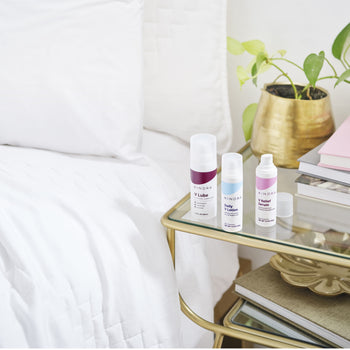Vaginal atrophy, also known as atrophic vaginitis, is the thinning, drying, and inflammation of the vaginal walls that is often found in postmenopausal women. With potentially one of the most lackluster scientific names, vaginal atrophy is a real stressor that often sets in during the peri/menopause evolution. The culprit behind vaginal atrophy is a decrease in estrogen, a key hormone produced by the ovaries. Due to the fluctuation of estrogen levels in the body during the menopausal era, it often sets in around perimenopause. However, vaginal atrophy can also onset during breast cancer treatment and even breastfeeding, also due to the decrease in the body's production of estrogen. Bear with us as we break down an all too common stressor paired with a name that definitely sounds like it was created by a male scientist years ago.
What Is Vaginal Atrophy?
Vaginal atrophy is most commonly marked by frustrating vaginal dryness, pain during sexual intercourse, and pesky urinary tract infections. With lower estrogen levels comes decreased lubrication produced by the body. What ensues is a thinning of the vaginal tissue that can lead to incontinence and a lack of interest in sexual activity. Since the vaginal skin is thinned, it means the vaginal skin naturally has less elasticity, making penetrative sex terribly uncomfortable.
If you're experiencing pain with urination or any other not-normal-for-you urinary symptoms paired with itching, dryness, and pain during sex, then it may be time to seek support from your women's health professional.
How Is Vaginal Atrophy Diagnosed?
If you're a menopausal woman wondering why your vagina feels drier and thinking something down there just feels a bit off, then you could be experiencing vaginal atrophy. A trip to your gynecologist can help determine for certain if this is what is disrupting your sense of comfort.
Your doctor may perform a pelvic exam, during which your doctor internally feels your pelvic organs and takes a look at your external genitalia. A urine test can be administered, especially if you're experiencing urinary tract infection symptoms. Finally, there's also an acid balance test, which involves taking a sample of your vaginal fluids and testing it to determine its acid balance.
Try a Vaginal Moisturizer
Over-the-counter treatment options are pretty simple thanks to vaginal moisturizers. We created a daily vaginal lotion that is perfect for treating vaginal atrophy. While lowered levels of estrogen are the root cause of atrophic vaginitis, our formula works to immediately reverse the damage done by providing 24 hours moisture that begins to heal the parched vaginal tissue. With results reported after just one day of use, our daily vaginal lotion can begin to ease and even reverse the effects of vaginal atrophy.
Find a Water-Based Lubricant
If you find you're feeling up for sex, it is important you're prepared with the right lubricant. Water-based lubricants are the preferred option for those navigating vaginal atrophy, since they're less likely to cause vaginal discomfort than oil-based lubricants. A bonus? They won't damage latex or silicone, making them sex toy safe. Remember that lubricants and vaginal moisturizers are two different things -- lubricant is used before and during sex while a moisturizer is for daily use.
Topical Estrogen Treatments Can Be Helpful
Topical estrogen treatments are low-dose inserts that directly boost vaginal estrogen. These can come in the form of vaginal cream, suppositories, and even an estrogen ring. You'll need a prescription from your doctor for any of these options. It is worth noting that vaginal estrogen therapy isn't a perfect match for every one, so be sure to chat with your OB-GYN to find the best solution for you.
Chat Through Options With Your Healthcare Provider
Hormone replacement therapy is often touted as a menopausal treatment that targets vaginal atrophy, hot flashes, mood swings, and other symptoms related to decreased estrogen production. However, it simply isn't an option for everyone. Furthermore, hormone replacement therapy can increase the risk of blood clots and stroke. Yikes! Chat through all options with your healthcare provider and see if a holistic approach could provide the relief you need first.
In Summary
We're here with you through this journey. Peri/menopause isn't easy, but it can be a deeply profound era with the right amount of relief, education, and support. Explore our line of formulas designed by women and backed by science. Join our Facebook group, a safe space for straight talk and more. No matter what part of your evolution you're in, you are Kindra.
Continue the Conversation
Leave a Reply
Tags: About Menopause body healthy vagina menopause 101 sex vaginal atrophy vaginal health














Can the daily vaginal moisturizer be inserted more than i inch into the vagina? If not, why not?
— Libby